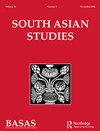Linguistic Hegemony and Latent Typology: The Case of Harappan Script Scholarship
IF 0.7
0 ASIAN STUDIES
引用次数: 0
Abstract
Harappan script scholarship is an archaeological discourse debating on the linguistic nature of the undeciphered signs, popularly known as Indus script. The article argues existence of linguistic hegemony in this scholarship and explicates its root causes, phases, consequences, and the present state of research. The phases are a result of combined influence of multiple parallel developments in the socio-political atmosphere, archaeological theory, technological innovations and changing mindsets. Following the antiquarianism during colonial time, the post-independence motion of imbibing ‘scientific’ approach in all academic faculties persuaded the archaeology domain to become more ‘processual’ and thus produce more ‘reliable’ knowledge. Harappan script decipherment studies based on statistical analysis of sign concordances manifest this scientific turn. These were rooted in the ideas of language and nation relationship, notional needs of developed past, and script considered as ‘essential feature’ of civilisation. The consequence is latency in typology studies of the artefacts which generally forms the basis for material interpretation epistemologies in archaeology. The recent advances in technology, accompanied by postmodern thought elaborate on the materiality, contextuality and typology to some extent. Thus, the hegemonic position assumed by the linguistics has posed serious constraints in this scholarship. GRAPHICAL ABSTRACT语言霸权与潜在类型学:以哈拉潘文字学术为例
哈拉帕文字学术是一种关于未破译符号的语言性质的考古学论述,通常被称为印度河文字。本文论述了语言霸权的存在,并阐述了其根源、阶段、后果和研究现状。这些阶段是社会政治氛围、考古理论、技术创新和思维方式变化等多重平行发展共同影响的结果。继殖民时期的古物研究之后,独立后所有学术院系都在吸收“科学”方法,这促使考古领域变得更加“程序化”,从而产生更“可靠”的知识。基于符号一致性统计分析的哈拉帕文字解密研究体现了这一科学转向。这些根植于语言和民族关系的观念,发达的过去的概念需求,以及被认为是文明的“基本特征”的文字。其结果是人工制品类型学研究的滞后,而这些类型学研究通常是考古学中材料解释认识论的基础。近代科技的进步,伴随着后现代思想,在一定程度上对物质性、文脉性和类型学进行了阐述。因此,语言学的霸权地位对这一学术研究造成了严重的制约。图形抽象
本文章由计算机程序翻译,如有差异,请以英文原文为准。
求助全文
约1分钟内获得全文
求助全文

 求助内容:
求助内容: 应助结果提醒方式:
应助结果提醒方式:


